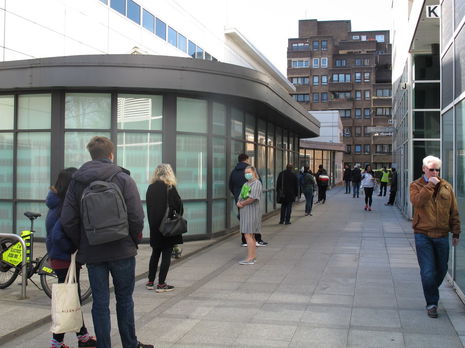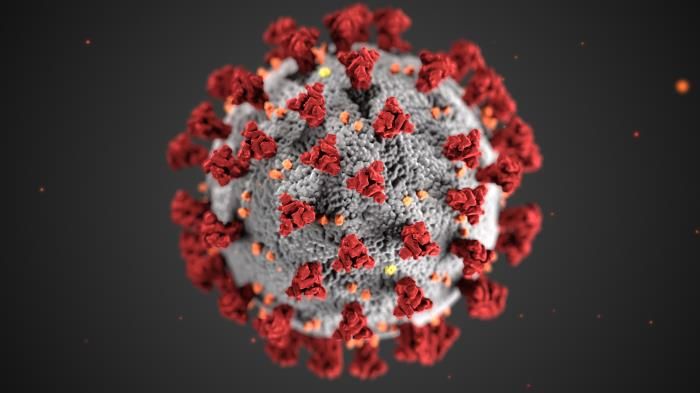Cambridge academic proposes voluntary infection as a possible lockdown exit strategy
In a new working paper, Dr Chris Hope proposes a novel approach to relaxing the Covid-19 lockdown but urges people to ‘not take matters into your own hands’

Dr Chris Hope, Emeritus Reader in Policy Modelling at the Judge Business School, proposes the possibility of a lockdown exit strategy based on voluntary infection.
In his ‘utilitarian analysis’, Hope suggests that ‘the Government could offer the opportunity for healthy people to choose to be immediately infected with COVID-19 in a controlled way and then confined to their homes until they are no longer infectious.’
Dr Hope, who is a Fellow of Clare Hall, was previously the specialist advisor to the House of Lords in an investigation into the economics of climate change.
Hope’s new research presents an alternative to the current UK lockdown, under which there is no demographic distinction. Currently, young and otherwise healthy people face the prospect of prolonged isolation and a loss of part or all or their income.
There is much debate about how life can return to something which resembles normality. With regards to the University, an email from Stephen Toope last week (07/05) outlined four possible scenarios which the University may follow in the coming year, ranging from ‘Rapid Recovery’ to ‘Global Gloom’. The scenarios outlined that whether students may return to Cambridge will depend on the trajectory of the Coivd-19 pandemic and the state of the Government’s lockdown.
Speaking to Varsity, Dr Hope summarised his paper: “It proposes a way for people to think about the option of voluntary exposure if it were to be offered by Government. It shows that the option could be attractive to some young, healthy, single people, and so should not be dismissed out of hand.”
The notion of voluntary infection is controversial. Late last month Twitter temporarily blocked the American, conservative publication, The Federalist, for promoting ‘controlled voluntary infection’ in the form of Covid-19 ’chickenpox parties’.
The Federalist article also came under fire from researchers based at John Hopkins University, who responded with the claim that ’COVID-19 is 100 times more lethal than the chickenpox.’ Their article added that ’someone who goes to a ‘coronavirus party’ to get infected would not only be substantially increasing their own chance of dying in the next month, they would also be putting their families and friends at risk’.
Hope emphasised that this is not a complete policy, nor is he arguing that voluntary infection is the best exit strategy. As Hope writes on his website, ‘it’s really just a proof of concept, to show the idea shouldn’t be dismissed out of hand’ and that the aim is to show that ‘voluntary exposure might look attractive to some people, although definitely not to others’.
The strategy of voluntary infection, argues Hope, offers individuals a choice between two options. Either ‘A. Social distance (SD) until the emergency is over, or they are infected anyway’ or ‘B. Choose controlled infected (CI) now, with testing, isolation and then immunity.’
Social distancing, Hope states, ‘leads to a quality of life drop, loss of earnings, later infection or no infection’ whereas controlled infection ‘allows me to obtain an earlier return to near-normal life, and a certainty that I’m not infecting others outside my household in exchange for increasing the small chance that I will suffer major symptoms, possibly death’.
Hope told Varsity that “the Johns Hopkins webpage does not distinguish between different groups in the population who have widely different infection fatality rates, so it is not relevant to the idea of voluntary exposure for young, healthy, single people.”
The strategy of voluntary infection relies crucially on the assumption that the virus poses a lower risk to younger people with no pre-existing health conditions.
David Spiegelhalter, Chair of the Winston Center for Risk and Evidence Communication, recently told The Telegraph that the personal risk to young people from Covid-19 was “staggeringly low”. Spiegelhalter continued: ‘If we look at under 25s, there’re 17 million of them in the country where we have 26 deaths recorded,’ which is a similar risk to ‘a couple of days’ in terms of general accidents. This line of reasoning is echoed by Hope, who compares the offering of voluntary infection to allowing people to pursue “mountain climbing and motorcycling”.
Dr Hope’s paper follows earlier suggestions by researchers at the University of Warwick to ‘‘release’ from lockdown’ those between the ages of 20-30 who do not live with parents. The Warwick paper claimed that lifting restrictions in this way would ‘lead to substantial economic and societal benefits without enormous health costs to the country’.
Yet Dr Hope’s working paper also warns caution. Hope told Varsity: “As I said in the paper, many people are capable of making an informal calculation like the one modelled here. If the government does not offer the option for voluntary exposure, some of those people may well be tempted to take matters into their own hands and become infected via friends or contacts.”
An uncontrolled spread of infection is precisely what Hope wishes to avoid, telling Varsity that ’this would be much less controlled than an official scheme, and in particular would not reliably avoid the contact with others while infectious, which is one of the main benefits of voluntary exposure.”
Avoiding uncontrolled and informal infection would negate all of the potential benefits of such a potential exit strategy, argues Hope. His paper concludes by urging people to ‘comply with government guidelines and not take matters into your own hands unless an officially sanctioned scheme is put in place’.
 News / Judge Business School advisor resigns over Epstein and Andrew links18 February 2026
News / Judge Business School advisor resigns over Epstein and Andrew links18 February 2026 News / Gov grants £36m to Cambridge supercomputer17 February 2026
News / Gov grants £36m to Cambridge supercomputer17 February 2026 News / CUCA members attend Reform rally in London20 February 2026
News / CUCA members attend Reform rally in London20 February 2026 News / Union speakers condemn ‘hateful’ Katie Hopkins speech14 February 2026
News / Union speakers condemn ‘hateful’ Katie Hopkins speech14 February 2026 News / Hundreds of Cambridge academics demand vote on fate of vet course20 February 2026
News / Hundreds of Cambridge academics demand vote on fate of vet course20 February 2026










